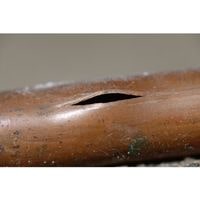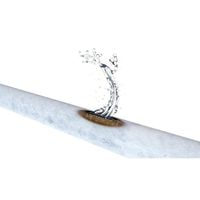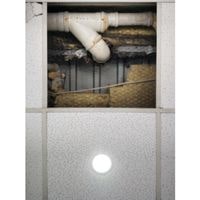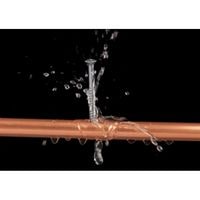What happens when a pipe bursts. When winter hits and the cold can freeze your pipes, you need to take precautions to prevent a potentially serious and expensive issue like bursting pipes.
There are several things you can do before the freezing temperatures arrive in order to save yourself from this ordeal.
You need to check the quality of your water supply and determine if any special chemicals are needed.
One way to protect yourself is by wrapping exposed pipes with heat tape. Leaking taps that still have time left on them before being replaced should be shut off completely as well so as not to cause damage when the room freezes up.
What happens when a pipe bursts

Even a small leak in a pipe can cause extensive water damage to the interiors of your home.
External walls aren’t immune either. Rain often causes large leaks on roofs and adjacent walls, such as inside stairwells.
Insulation may become soggy in walls, resulting in mold growth and foul odors.
Wires exposed to water will lose their efficiency over time as rust forms on them, increasing the risk of fires.
Damage to the floor

A broken water pipe may cause as much as $4,000 in damage, so you do not want to ignore a hole in your ceiling.
A slow leak can cause stains and texture damage to your flooring, but a fast-moving burst can also be damaging.
This is why it’s important to find out why the pipe broke in the first place and who is responsible for fixing it.
Ceiling damage

When pipes burst on the second floor of a house, it’s common for the water to soak down through the floor and into the ceilings of lower rooms and eventually start pouring out through the ceiling.
This often happens at unexpected times, can take a while to fix, and can cause electrical fixtures, support beams, and even insulation in your ceiling to be impaired or damaged beyond repair.
Damage to the Walls
When a house experiences flooding or water damage due to a burst pipe, the first casualty is usually the interior and exterior walls. Insulation may grow soaked and begin to crumble.
Wires, already damaged by the water, may cause electrical shorts that could lead to an electrical fire. Exterior walls can become affected as water coats and saturate plaster, wood, or stucco.
If enough damage is sustained for too long of a time period, the structural integrity of your house might be adversely affected as well.
Typical damage to interiors
Bursting pipes may cause water to accumulate in excessively wet or humid areas, like bathrooms and small basements.
Soiled rugs, carpets, and other large pieces of furniture can consequently become stained from water seepage rising from the floor.
Not only does this make the room dirty, but it also makes it a potentially unsafe place for you to step into.
Electrical fixtures and chords, as well as electrical wiring in basement areas, are some of the greatest concerns because they don’t seem like they would be fully at risk until there is actually a build-up of water around them.
Missing ceilings or parts of walls may look great at first but they will eventually wear down over time due to exposure to moisture and humidity that accompanies an improperly drained pipe.
The prevention of burst pipes
The majority of people living in colder climes should consider purchasing well pumps that serve the furnace. They make it far simpler for you to stop a pipe leak whenever your outside plumbing sustains damage.
While on vacation, it is best to turn off both the water and power supply to a house in which its residents will not be staying for an extended duration of time.
This greatly reduces the possibility of sustaining costly water damage due to leaks.
While on holiday, even if you’re away from home for a few days, signing up with someone as a proofreading dog will still benefit you since you could end up with many small problems that may seem insignificant alone but can add up quickly, so it pays to check anyway.
How do you know if a pipe burst?
Water pressure that either shoots into the air or stays too low can result in a burst pipe. Signs of a leaky pipe include wacky water pressure at your house, discolored, smelly water, and clanging or dripping noises coming from inside the walls.
What damage does a burst pipe cause?
As a homeowner, this is a plumbing emergency you don’t want to ignore. Your pipes could burst causing leaks and flooding in your walls, floors, and ceilings.
Not only can this result in severe structural damage, but it can be very costly to repair as well.
what happens when a pipe bursts
Related Guides
